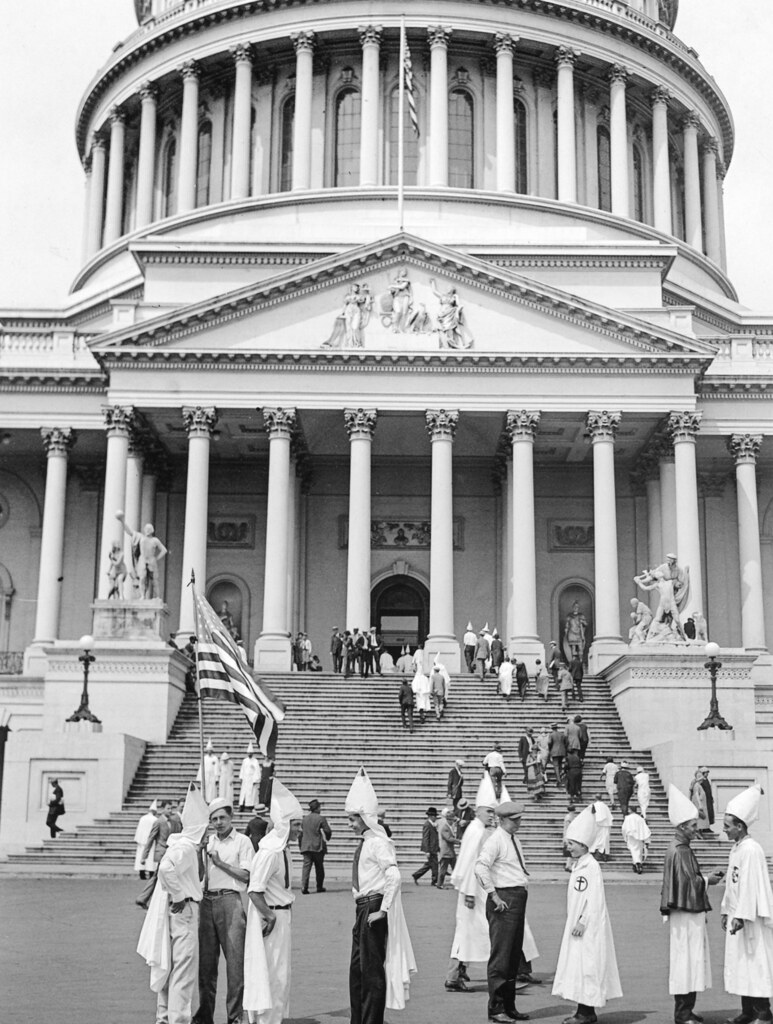
The Universal Application of Laws is Never Equal: Antisemitism in U.S. Law
Mia Brett
“Klan display their robes at the U.S. Capitol: 1925” by Washington Area Spark (CC BY-NC 2.0 DEED).
Until the Civil Rights movement in the twentieth century, courts interpreted laws as non-discriminatory if they applied equally to all, no matter their impact. Segregation, anti-miscegenation laws, and “Sunday Laws” were all constitutional because they all applied to both white and Black people, Christian and Jewish people. It did not matter if the impact of such laws was that Black people went to worse schools or Jewish people were forced to work on their Sabbath because everyone was required to go to segregated schools or close their business on Sundays. Such laws were also not considered violations of the Free Exercise Clause of the Constitution (or state constitutions before the 1920s) because requiring a person to appear in court on their sabbath or close their business for another religion’s sabbath did not stop that person from practicing their religion. Today a universal application of a law is not supposed to be sufficient to deem it non-discriminatory. Today, laws must not only be “facially neutral,” but also non-discriminatory in their intent as well as impact. Unfortunately the long history of assumed Christian majority and neutrality cannot be removed from our laws so easily.

“In the interest of labor and morality” by Louis Dalrymple Retrieved from the Library of Congress.
Many people wrongly assume the First Amendment of the Constitution was sufficient to protect Jewish religious practice from legal interference or discrimination. While the First Amendment protects the free exercise of religion, what that meant in the 18th and 19th centuries differs greatly from our plural contemporary understanding. When the Bill of Rights was first ratified it only applied to the acts of the federal government, not the states.
Many state governments initially included explicit Christian protections in their laws. Religious requirements for political office existed in many colonial governments and state constitutions after the Revolutionary War. The Massachusetts Constitution limited office holding to Protestants in 1780 and didn’t remove the provision until 1821. In New Hampshire non-Protestants couldn’t hold office until 1876. Maryland, Rhode Island, North Carolina and New Hampshire did not allow non-Christian voting until well into the 19th century when the franchise expanded in 1826, 1842, 1868, and 1877, respectively. Many states initially interpreted the “free exercise of religion” to be the free exercise of Christianity or even just the free exercise of Protestantism.
Many states initially interpreted the “free exercise of religion” to be the free exercise of Christianity or even just the free exercise of Protestantism.
While states eventually removed any laws explicitly privileging Christians from their constitutions, there were still many facially neutral laws that privileged Christian practice while appearing to have universal application. “Sunday laws” were an early form of codified legal discrimination that forbid any business from opening on Sundays. There were a number of cases where Jewish business owners were actually prosecuted for working on Sundays. Additionally, there were religious exemption cases that resulted from court orders that required witnesses to appear on Saturdays, during the Jewish Sabbath. Unfortunately, the religious exemption cases challenging the orders to appear on Saturdays were rarely successful in the late nineteenth century as courts claimed the laws equally applied to everyone. “Sunday Law” prosecutions saw a resurgence in the 1880s as a result of increased Jewish immigration and Protestant fervor. States also might allow Jews to vote or run for office while requiring actions like voter registration to be done on Saturdays.
Without knowledge of Jewish customs courts often assumed nefarious behavior where there was none, as in a case involving European Jewish immigrant Pesach Rubenstein in 1876. Rubenstein was charged and convicted for killing his pregnant cousin. Witnesses described seeing a man with dark facial hair and “side whiskers” with the victim. Without realizing (or not caring) that such a description would describe many observant Jews, police arrested Rubenstein. They then interrogated him with a German interpreter, not a Yiddish one, and got frustrated that he wasn’t cooperating in the interview because there was likely a significant language barrier. He was also denied kosher food and police were suspect of his “peculiar devotions” in praying with tefillin. Rubenstein was found guilty after an extremely bigoted closing argument that indicted the entire community of Eastern European Jews in dehumanizing language portraying them as dirty, peculiar, ignorant, despised, and isolated. Criminal procedure laws for the time were applied equally to Rubenstein and other non-Jewish defendants but that doesn’t mean they weren’t discriminatory against him.
At the turn of the century, the influx of Eastern European Jewish immigrants led to an increase in bigamy cases as a result of confusion over the need for a civil divorce after receiving an ecclesiastical divorce. Rather than simply helping the immigrants obtain the needed civil divorce, newspaper articles and courts expressed significant ire towards the rabbis performing ecclesiastical divorces at all. Rabbis were accused of taking advantage of “ignorant adherents” for even granting ecclesiastical divorces without also ensuring the people got civil divorces. One grand jury even recommended that the legislature enact a prohibition against ecclesiastical divorces until a civil divorce had been obtained. The legislature did not listen but that didn’t stop judges from criticizing rabbis from the bench for simply performing their religious duties.

“Sign outside of the Meadowbrook Swimming Club, Maryland” by Anti-Defamation League.
Federal courts had made clear that laws had to be applied equally after the Civil War, but that only regulated state actors, which allowed for a lot of discrimination by civilians until the mid-twentieth century. While the Supreme Court had ruled the state could not enforce segregation ordinances in Buchanan v. Warley in 1917, it did not regulate civilian enforced segregation.
The goal of city ordinances to prevent Black people from buying property in white areas could be achieved through things like restrictive covenants on property. A restrictive covenant is a document attached to a property that imposed restrictions on who that property could be sold to, such as a contract that didn’t allow a property to be sold to a Black family. These contracts often not only disallowed Black people from buying property, but also ensured Jews couldn’t buy into neighborhoods. The Supreme Court ruled such contracts were constitutional in Corrigan v. Buckley in 1926. While they were ruled unconstitutional twenty years later in Shelley v. Kramer, discriminatory practices in real estate continued. Realtors refused to show property to Jews or other “undesirable” groups, people refused to sell their property to anyone who was not white and Christian, and banks would not issue mortgages if certain people wanted to buy property.
Discriminatory practices as a result of systemic racism and antisemitism still exist today. The assumption that white Christianity is the “neutral” or “normal” status for Americans perpetuates discrimination against Jews. The Supreme Court ruled that Christmas displays can have a “secular purpose” in Lynch v. Donnelly in 1984. Jewish symbols or Chanukah displays have not been granted the same protection. “Blue Laws” requiring certain businesses be closed on Sundays still exist in states across the country and Christian holidays are regularly required time off for schools and jobs while Jewish, or other non-Christian religious holidays are treated as personal time off. This term the Supreme Court ruled in Kennedy v. Bremerton School District that a football coach could lead Christian prayers after a game which will undoubtedly increase discrimination against Jews, as well as Muslims and other religious students.
The assumption that white Christianity is the “neutral” or “normal” status for Americans perpetuates discrimination against Jews.
Christian religious belief is the justification for many civil rights challenges we are seeing right now. While the language in the briefs might pretend to have a secular justification, the reasoning to challenge gay marriage or abortion or birth control rests on Christian religion. Politicians often say so even if lawyers know better. Some rabbis and lawyers are also building a challenge to abortion bans on a religious freedom basis since Jewish law requires the life of the mother be prioritized over the fetus. It’s unclear if the courts will accept such an argument especially because they continue to see Christian morality as the default and “secular.” The opinion in Dobbs v. Jackson is built on a Christian understanding of when “life” begins shrouded in claims that twist science and history.
In a more explicit support of the enforcement of Christian values, 10 states have laws that allow adoption agencies to refuse Jewish families (or LGBT people or members of other non-Christian religions) services or access to adoption based on a lack of belief in Christianity. In a recent Tennessee case challenging a law allowing for adoption agencies to deny services based on religious belief, a three-judge panel ruled a Jewish couple was not discriminated against by such a law. The opinion justified their ruling in part by arguing the law isn’t discriminatory because it “does not single out people of the Jewish faith as a disfavored, innately inferior group.” Based on this theory of discrimination, Jewish families could be completely barred from foster or adoption services without a court acknowledging discrimination.
While the legal understanding of discrimination has moved past an understanding of equality as the equal application of laws, that does not mean discrimination against Jews has disappeared. If Christianity is treated as the secular default and Judaism is treated as a religion Christianity will always be privileged and Jewish people will be unable to attain equal treatment. Additionally, if the standard set forth by the Tennessee court (which claimed that a law is only discriminatory if it targets a group as “innately inferior”) is adopted, discrimination against Jews and other groups will likely increase drastically in the coming years. Unfortunately, discrimination is only discrimination if a court says it is. ♦

Mia Brett has a PhD in history specializing in the legal construction of race. She is currently a Visiting Assistant Professor of African American History at Washington and Lee University.
Recommended Citation
Brett, Mia. “The Universal Application of Laws is Never Equal: Antisemitism in US Law.” Canopy Forum, August 18, 2022. https://canopyforum.org/2022/08/18/the-universal-application-of-laws-is-never-equal-antisemitism-in-us-law/

